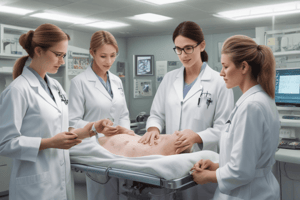Podcast
Questions and Answers
Which of the following exercises involves tightening or tensing muscles without moving body parts?
Which of the following exercises involves tightening or tensing muscles without moving body parts?
- Resistive exercises
- Isotonic exercises
- Cardio exercises
- Isometric exercises (correct)
Isotonic exercises cause muscle contraction and do not change muscle length.
Isotonic exercises cause muscle contraction and do not change muscle length.
False (B)
What should be done for a patient experiencing dizziness for 60 seconds after standing?
What should be done for a patient experiencing dizziness for 60 seconds after standing?
Return the patient to bed.
____ exercises utilize muscle resistance against a stationary object.
____ exercises utilize muscle resistance against a stationary object.
Match the type of exercise to its example:
Match the type of exercise to its example:
Which sleep stage is considered the deepest and most difficult to awaken from?
Which sleep stage is considered the deepest and most difficult to awaken from?
Adolescents generally require more sleep than young adults.
Adolescents generally require more sleep than young adults.
What part of the brain is responsible for regulating sleep and promoting wakefulness?
What part of the brain is responsible for regulating sleep and promoting wakefulness?
The average sleep requirement for neonates is _____ hours.
The average sleep requirement for neonates is _____ hours.
Match the age group with their average sleep requirement:
Match the age group with their average sleep requirement:
Flashcards
Sleep Stages
Sleep Stages
Phases of sleep including N1, N2, N3, and REM.
N3 Sleep
N3 Sleep
Slow-wave sleep, the deepest sleep stage, hard to awaken.
REM Sleep
REM Sleep
A sleep stage important for memory and brain development.
Neonates Sleep Requirement
Neonates Sleep Requirement
Signup and view all the flashcards
Activity Tolerance
Activity Tolerance
Signup and view all the flashcards
Isotonic exercises
Isotonic exercises
Signup and view all the flashcards
Isometric exercises
Isometric exercises
Signup and view all the flashcards
Resistive exercises
Resistive exercises
Signup and view all the flashcards
Helping a Patient Walk
Helping a Patient Walk
Signup and view all the flashcards
Effects of immobility
Effects of immobility
Signup and view all the flashcards
Study Notes
Exam 1 Blueprint
- Covers modules 1-3
- 60 questions, including multiple choice, multiple answer, true/false, and dosage calculations
- 15% of final course grade
- Review module outcomes, reading assignments, activities, and module summaries
- NCLEX style questions, focusing on comprehension, application, and analysis
Module 1: Critical Thinking Module Outcomes
- Clinical Judgment & Reasoning in Nursing Process: Clinical judgment relies on a nurse's experience and knowledge of the patient, typical responses, and patient concerns. Clinical reasoning involves asking questions and gathering relevant information to understand the situation. The nursing process (ADPIE) is crucial in making clinical decisions using experience and reflection.
- Reflection in Critical Thinking: Reflection is a critical thinking skill involving reviewing a situation to understand its meaning and gain new knowledge, leading to better practice. The reflection process helps nurses identify better practices.
- Subjective vs Objective Data: Subjective data are patient-reported symptoms, feelings, and perceptions (e.g., pain). Objective data are observations and measurements made by the nurse (e.g., measuring blood pressure).
- Critical thinking and the scientific method: Critical thinking is essential in the nursing process. Example, observing patient behavior and how it's used in the scientific method.
Module 2: Foundations of Nursing Care Module Outcomes
- Patient Safety Factors: Factors negatively impacting patient safety include falls, unsafe home environments, fires, seizure precautions, etc. This is including Maslow's hierarchy of basic needs (Oxygen, nutrition, temperature)
- Task Delegation: Delegation to unlicensed assistive personnel (UAP) and Licensed Practical Nurses (LPN) is crucial for efficient care. Ensure delegated tasks are appropriate and supervise to ensure they're completed correctly.
Module 3: Basic Physiological Concepts Part 1 Module Outcomes
- Effects of Immobility: Immobility impacts patients physiologically (skeletal, muscular, endocrine/metabolic), and psychosocially (isolation, irritability, apathy).
- Pressure Injuries: Identify risk factors for development, prevention, and associated diagnoses (including nutrition, tissue perfusion, and infection).
- Types of wounds & draining Know when seeing: serous, sanguinous, serosanguineous or purulent drainage.
- Wound Healing Phases: Understand Hemostasis, inflammatory, proliferative, & maturation phases.
Studying That Suits You
Use AI to generate personalized quizzes and flashcards to suit your learning preferences.



